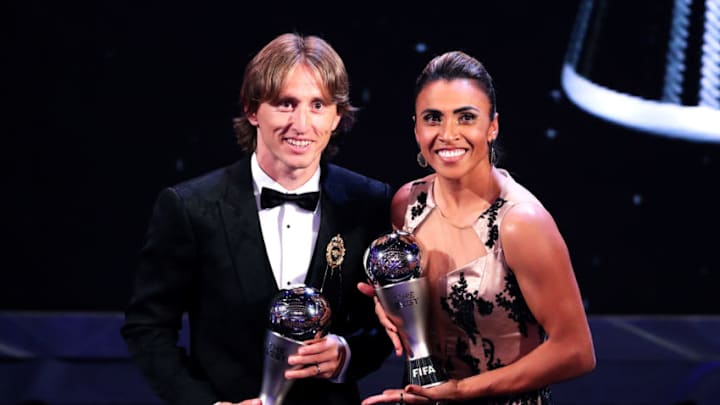After another controversial Best FIFA awards night, its time for the footballing world to ask serious questions about the value we put on these awards.
After a long winded and wearing ceremony, Luka Modric was crowned Best FIFA men’s player to cap off a brilliant year and further his chances of picking up the Ballon D’or in December.
The women’s award was taken by Marta, while Didier Deschamps World Cup win earned him men’s coach of the year.
Naturally, the awards caused a lot of debate on social media with many fans rightfully confused with Dani Alves’s selection in the FIFPro World11 and David DeGea’s omission from the three-man shortlist for the best goalkeeper award, which was won by Thibaut Courtois, though DeGea was then selected in the FIFPro World11.
Dani Alves in 2018:
— Lost_In_Football (@LostInFutbol) September 24, 2018
16 club games
2 games for Brazil
Last 16 of the Champions League
Didn't go to the World Cup
Hasn't played this season
FIFA World XI right-back. #TheBest #FIFAFootballAwards pic.twitter.com/LE7tZbJdn8
Here are the problems with FIFA Awards:
— Naya (@Naya23_lfc) September 24, 2018
Mo Salah is nominated for best player but not in the world 11
Courtois is given best goalkeeper but isn't in World 11
Salah wins best goal when it isn't even his own best goal
Dani Alves in the world 11 #FIFAFootballAwards
One could write for days about the omissions, contradictions and winners for each section. One could ask why a man won the women’s coach award, one could ponder why Salah’s goal against Everton was even nominated for the Puskas, let alone winning the award outright. This article could go over the same old beaten ground we go over every year these awards are announced. Ultimately, nitpicking at this year’s decisions would be, like the awards themselves, pointless.
Instead of questioning the nitty gritty of each category on an annual basis, its time that the footballing community asked itself if awards, such as the Best FIFA awards, are truly worth the trouble anymore.
Gabrielle Marcotti in a recent ESPN article opened up about his experiences voting in these individual awards, bringing up some interesting points. He argues that the journalists, coaches and players regularly have other things on their mind when the ballot cards arrive, saying, “The ballot comes and you need to fill it out amid getting on with your day job, which might include worrying about getting back into the starting lineup, avoiding the sack because you’re doing badly in qualifying or simply figuring out how you’re going to pay both your mortgage and your car loan that month”.
Looking at the player voting cards, its quite clear that players vote for their teammates rather than who they think is actually the best. They never vote for a player from a rival club, which further robs the award of any ounce of objectivity. It’s hard to blame them for this voting pattern as many of the frequent players to the podium are quite competitive about the award. Jonathan Wilson noted, after watching the premiere of Cristiano Ronaldo’s feature film, how important the title meant to him, going as far as to claim that it was more important to him than the team titles he had won.
Franck Ribery was clearly frustrated that he didn’t win the Ballon D’or in 2013. “I feel I had earned this award. It’s all politics,” he claimed after the ceremony. Ronaldo and Ribery are likely not the only players who regularly compete and value individual accolades, and even for those who aren’t, it wouldn’t look good for any player to vote for rival players. Despite clear biases or general ambivalence towards individual awards, journalists, coaches and players account for 75 percent of the vote, with the rest sitting with fans.
When the Ballon D’or, the first individual award of its kind, was first established in 1956, it was created in the hope of sparking debate amongst fans. As time has passed, however, that debate has changed quite drastically. Ronaldo and Messi fans used these individual awards as an endorsement of the other’s greatness and seem to think that whoever retires with the most Ballon D’ors or other individual accolades will be remembered as the better player.
The awards have gotten to such a level of prestige that they overshadow team successes, with some fans celebrating team successes more so because it strengthens their preferred individual’s case for sweeping the individual awards at the end of the season. One could say that once Messi and Ronaldo retire, this culture of player over club among fans will go away, but with the growing influence of social media and player public relations, it seems very unlikely. Philip Lahm wrote in a column for Goal that the FIFA Ballon D’or is merely a popularity contest among strikers, claiming that even he had fallen victim to choosing the biggest names rather than the best players.
Lahm also points out that the award heavily favors attackers, claiming that Fabio Cannavaro was the last true defender to win the Ballon D’or. In the history of the Ballon D’or, only one goalkeeper and three defenders have won the title. This trend looks set to continue with attacking players continuing to dominate the podium. Due to the wealth of young attacking talent already gaining a strong social media presence, it seems that Modric’s win in London will be an exception to the rule rather than any change.
As the Messi and Ronaldo hegemony looks to be winding down, the footballing community is left at a crossroads. Does it continue to overshadow the team aspect of soccer and glorify popular, attacking players who recieve plenty of plaudits as is or do they realize that these awards were never meant to objectively judge individual player qualities. One thing for certain is that the awards can’t carry on in their current format if they wish to be taken seriously.
